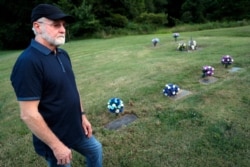Every day, more than 130 people in the U.S. die of an opioid overdose, but in one state heavily impacted by the opioid crisis, innovative solutions are now advancing with the hope of saving lives.
The opioid epidemic has taken an unspeakable toll on individuals, families and communities in the U.S.
To fight back, the Midwestern state of Ohio set up a competition open to scientists, tech companies and individuals to help end this crisis. The four winners are each receiving a $1 million to further develop their products.
Two apps
One of the winning entries is an app developed at University Hospitals in Cleveland.
The app helps doctors determine if a patient who is given a prescription for an opioid is likely to have an addiction problem. Hospital administrator Jonathan Sague says patients who are approved for an opioid prescription also get help in preventing addiction.
“We then bring in the social worker to connect that patient to care in the community as they leave our hospital with acute pain and an opioid prescription,” Sague said, “because we don’t want them to fight that battle alone when they go home.”
Sague says the program at University Hospitals has, so far, kept more than 12,000 opioid pills out of communities.
“It’s not just about the number of pills,” he said, “it’s about real number of human lives that are being affected positively by not being exposed to these opioids.”
Another app helps those recovering from addiction track their progress and stay accountable.
Smart button, soothing mattress
A third winner is a company named Prapela that developed a mattress designed to gently vibrate and soothe newborns addicted to opioids. John Konsin heads the company.
“When an infant lays down on the pad that is vibrating, (it) actually slows down their breathing and heart rate to a normal, healthy rhythmic rate. And when that occurs, babies relax,” Konsin said.
Another tech solution is a smart button that helps people battling addition call for help. It was co-designed by a company called Brave, which is headed by Gordon Casey.
“Brave’s technology offers people who are at risk for overdose a way for them to connect with somebody even though they’re alone physically, so that in the event that they do overdose, we can find them and we can get help sent to them immediately,” Casey said.
The state of Ohio has a huge opioid addiction problem. The state’s goal is to help develop technologies that can be a part of stopping the crisis and saving lives throughout the U.S.







